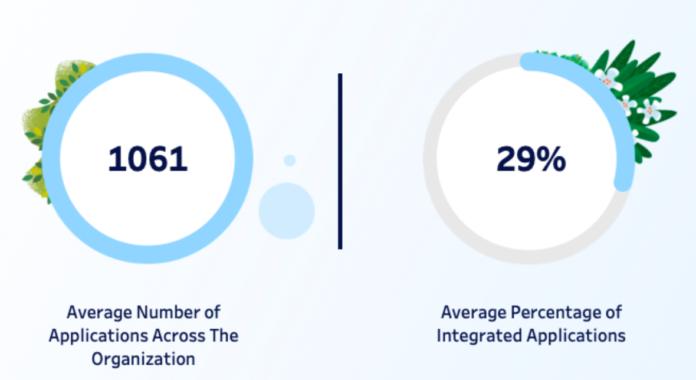Business application volumes within organisations in Singapore have increased nearly 10% in the past year to surpass 1,000 on average, but less than 30% are integrated, creating data silos that lead to rising costs, duplicated work, productivity bottlenecks, and disconnected experiences.
MuleSoft’s annual Connectivity Benchmark Report surveyed 100 CIOs and IT decision makers in Singapore to better understand these challenges and what organisations can do to succeed amid economic uncertainty.
Despite digital transformation advancements, 78% of respondents say integration challenges slow their efforts — causing infrastructure issues and major risks as IT budgets come under new scrutiny.
In Singapore, organisations are using an average of 1,064 different applications, but only 29% of these applications are currently integrated, creating data silos that lead to rising costs.
Firms spent on average $6.8 million on custom integration labour in the past 12 months, and 41% of respondents say integrating siloed apps and data is their biggest digital transformation challenge.
As organisations in Singapore become more digitally- and cost-centered, they are using APIs to integrate apps and data to create exceptional customer experiences and generate revenue.
The study found that 74% of organisations have a mature strategy to empower non-technical users to easily integrate applications and data sources using APIs, demonstrating that low-code tools can improve business agility.
On average, organisations are generating 38% of revenue from APIs. Further, 81% of organisations now have a top-down API integration strategy.
IT teams that manage an organisation’s tech operations are increasingly looking to automation for efficiency and organisation-wide productivity solutions.
RPA — which enables teams to automate business processes and tasks with bots — is one automation technology seeing rapid adoption across enterprises, with 31% per cent of organisations investing in the technology.
In Singapore, 91% of firms said at least one department within their company requires both integration and automation, and developers (73%), IT operations (73%), and application administrators (55%) are most likely to be responsible for automating business processes.
Data science (71%), product (70%), business analysts (60%), customer support (61%), finance (60%), marketing (58%), engineering (64%), and HR (53%) report a need for automation in their departments.
On average, 46% of organisations’ internal software assets and components are available to developers for reuse, an opportunity for greater integration efficiency.
Globally, businesses have saved up to 109 billion hours every month using automation tools that enable employees to focus on higher value work.
By taking a unified approach to integration, API management, and automation, businesses are able to drive efficiency, agility, and continuous innovation.
Despite an increase in IT project volume (40% growth year over year), most (76%) organisations in Singapore are ahead of schedule on digital transformation progress due, in part, to infrastructure improvement.
However, the cost of failure to complete projects has risen, adding risk to business’ bottom lines.
Among IT teams, 55% say they completed all of the IT projects asked of them last year, and 30% of projects weren’t delivered on time.
Just 41% of organisations now say it is difficult to make changes to a particular system or applications because of their IT infrastructure.
The average cost of failing to complete digital transformation initiatives now sits at $10.2 million annually.
















